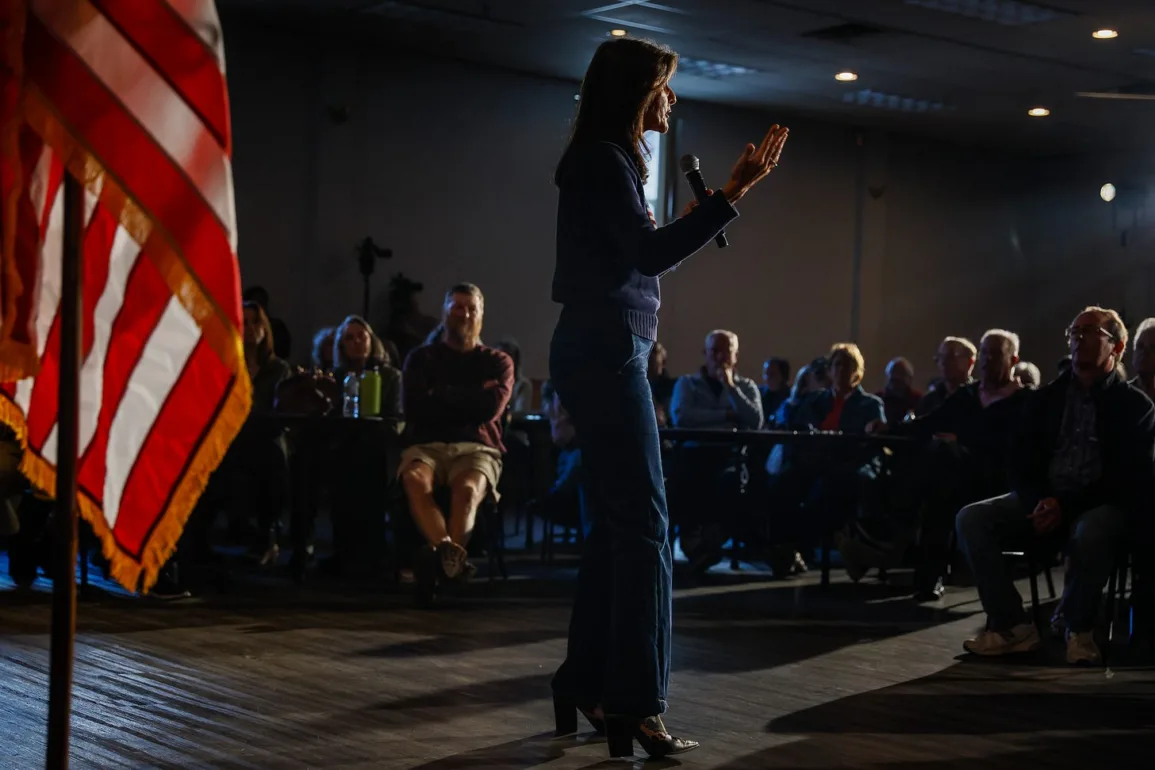THE NATIONAL MUSEUM OF AMERICAN HISTORY owns a very special pair of red, white, and blue flip-flops. Republicans sold them at their 2004 convention to fuel their flip-flop attacks on then-Sen. John Kerry, the Democrat running against President George W. Bush.
I nominate Nikki Haley for her own Smithsonian exhibit. She may or may not be on track to wrest the 2024 Republican nomination from Donald Trump, but this much is clear: She’s already a museum-level flip-flopper. Flip-flops with five-inch heels, anyone?
Haley’s prospects of emerging as Trump’s chief primary rival grew much stronger Tuesday with twin endorsements from the powerful, well-resourced Koch network and Judd Gregg, the former governor, House member, and senator from influential New Hampshire, which holds the FITN primary—first in the nation. So far, she has avoided much scrutiny of her flips and her flops. Expect that to change.
A flip-flop can be an evolution, a reasoned reconsideration based on new facts or convincing arguments. But Haley’s are different: constant, public, and blatantly tactical and strategic.
This is not the “engaging ambiguity” of a Franklin D. Roosevelt, whose vague nods and “yes, yes, yes” responses left people with the misimpression that he not only heard them, he agreed with them, as Warren Moscow told the New York Times in 1982. Haley is a former South Carolina governor and United Nations ambassador who has made it almost impossible to discern where she stands on the two fundamental issues driving Democratic electoral success in the last three years: abortion and the Trump threat to democracy.
IF HALEY IS THE CLEAR REPUBLICAN ALTERNATIVE to Trump, what would be her platform? If she somehow captures the nomination, what would she promise? If she ended up in the Oval Office, how would she govern?
It is probably safe to say Haley would not try to seize power or hold on to it if she lost a presidential election. But would she compromise U.S. democracy in other ways? For instance, how would she handle Trump and his MAGA movement? Her history tells us nothing.
Back in 2016, Haley called Trump “everything a governor doesn’t want in a president,” but she then joined his administration as U.N. ambassador and endorsed him for a second term. He was “incredibly reckless with our national security” in the Mar-a-Lago classified documents case, she has said, but she also attacked the criminal justice system and said that if he’s convicted, she’d be inclined to pardon him.
She said after January 6th that history would judge Trump harshly and the GOP should move on from him. But she also said “give the man a break,” opposed impeachment, and campaigned for 2020 election deniers last year. Though some news organizations did not note the passive voice, her recent campaign-trail language carefully avoids direct cause, effect, and blame. “Chaos follows him,” she said of Trump in South Carolina this week. I wonder why that is. “We have too much division in this country,” she said. Again, I wonder why that is.
Haley has forged a similarly confusing path on abortion access. She argued at both the first and third GOP debates that a federal ban is impossible because it would not pass the Senate. She also suggested that there’s a national consensus to ban late-term abortions (incorrect and problematic—has she never considered medical crises or major fetal abnormalities?).
In that third debate, repeating a point she’d made in May, Haley said that she would “sign anything where we can get sixty Senate votes” to break a filibuster—and that was unlikely to happen. Days later, Haley told a Christian forum she’d sign a six-week ban on abortion if she were still governor of South Carolina. “Whatever the people decide,” she said. Some have taken from her remarks, and a conversation with a prominent Christian activist in Iowa, that she’d also sign a national six-week ban as president.
FROM TRUMP’S PERSPECTIVE, Haley’s most stunning reversal is her 2021 statement that she would not run for president if Trump entered the 2024 race. She walked that back early this year and now she’s one of Trump’s targets.
He mocked her this month in Iowa for running against him after promising she wouldn’t:
“Sir, I will never ever vote against you. You are the greatest president in my lifetime.” It’s not that long. She’s not that old, actually. I would’ve preferred if she said in generations, but. . . .
What is she, 54 or something? I’ll take the 54, right? But “You are the greatest president. Sir, I will never. . .” She’d said it over and over again. “I will never. . .” “Will you ever run against. . .” “No, I will not. He’s been a great president. I will not do it.” Two months later, “Ladies and gentlemen, I’d like to announce my candidacy.” . . . I know her well. She’s not up to the job.
Actually, Haley is 51, and is wielding the age issue against both Trump and Joe Biden with her proposal for “mandatory mental competency tests” for candidates over 75. Trump’s response was akin to Ronald Reagan’s 1984 joke about not using Walter Mondale’s “youth and inexperience” against him. Just not as funny.
HALEY’S VIEWS on taxes, spending, social programs and health care—adamantly against Medicaid expansion and a federal health care role generally—are in diametric opposition to mine, but to be fair, they have been consistent. The same can be said of her foreign policy positions, which do align with mine: Strong for Ukraine and Israel, strong against dictators and autocrats. I hear all the voices, including my husband’s, pointing out that whatever Haley’s weaknesses, she is no Trump. And thank goodness for that.
At this point she is no Kerry, either. Kerry and Bush both had their share of flips and flops, but it was Kerry who paid a high price for a single short sentence: “I actually did vote for the $87 billion before I voted against it.” The subject was a bill funding military operations in Afghanistan and Iraq, and he was trying to say he’d voted for a version that reduced some of Bush’s tax cuts because he thought the wealthiest people in America should “share the burden of paying for that war.”
To Kerry, it was “one of those inarticulate moments.” To Team Bush, it was campaign gold.
So far, Haley’s flip-flops have escaped this level of weaponization. That may be because the four-times-indicted Trump has such a commanding lead over the GOP primary field, or because so many other candidates—from Haley to Chris Christie to Ron DeSantis to Trump himself—have fudged and back-flipped and danced around hot-button issues and people. There’s very little safe space in the GOP these days.
Haley has frequently promoted her own candidacy by making the stone-cold, values-free case that Trump is unelectable. That is not borne out in recent polling that has induced panic among some Democrats and Never Trumpers. Which raises the question, is Haley any more electable than Trump? Maybe. Yet she has created such a muddle on abortion rights and the Trump/MAGA threat to democracy that it’s unclear if she’d win over more people than expected, or alienate more of them.
Who can be confident about what she’d do on abortion or Trump? The right? The left? The center? Who knows. Haley says she’s never lost an election. Maybe that’s the plan. Beat the odds and win, then figure out the rest later.



